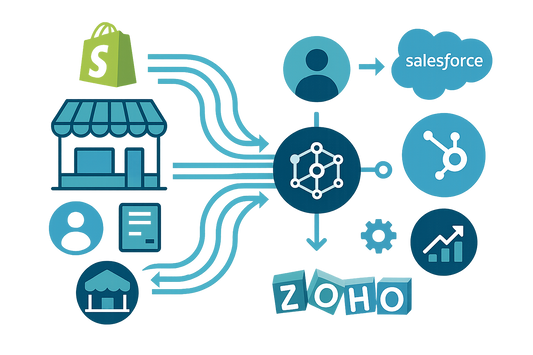How Shopify’s Analytics Tools Can Improve Your Business Strategy
Share
In the ever-evolving landscape of e-commerce, understanding your customers is paramount to crafting a successful business strategy. Shopify, a leading e-commerce platform, offers a suite of analytics tools that can significantly enhance your understanding of customer behavior and preferences. By leveraging these tools, businesses can gain valuable insights that inform decision-making and drive growth.
To begin with, Shopify's analytics tools provide a comprehensive overview of your store's performance. This includes data on sales, customer behavior, and product performance, all of which are crucial for identifying trends and patterns. For instance, by analyzing sales data, you can determine which products are most popular among your customers and adjust your inventory accordingly. This not only helps in meeting customer demand but also in optimizing stock levels, thereby reducing overhead costs.
Moreover, Shopify's analytics tools offer detailed insights into customer behavior. By examining metrics such as average order value, customer lifetime value, and purchase frequency, businesses can better understand their customers' purchasing habits. This information is invaluable for tailoring marketing strategies to target specific customer segments more effectively. For example, if you notice that a particular group of customers tends to make repeat purchases, you might consider implementing a loyalty program to further encourage their patronage.
In addition to understanding customer behavior, Shopify's analytics tools also enable businesses to track the effectiveness of their marketing campaigns. By analyzing data on traffic sources, conversion rates, and customer acquisition costs, you can assess which marketing channels are delivering the best return on investment. This allows you to allocate resources more efficiently, focusing on strategies that yield the highest impact. Furthermore, by identifying underperforming campaigns, you can make necessary adjustments to improve their effectiveness.
Transitioning from marketing to customer experience, Shopify's analytics tools also play a crucial role in enhancing the overall shopping experience. By monitoring metrics such as cart abandonment rates and checkout behavior, businesses can identify potential barriers in the purchasing process. Addressing these issues can lead to a smoother, more enjoyable shopping experience for customers, ultimately increasing conversion rates and boosting sales.
Another significant advantage of using Shopify's analytics tools is the ability to personalize the shopping experience. By leveraging customer data, businesses can create targeted marketing campaigns and personalized product recommendations. This level of personalization not only enhances customer satisfaction but also fosters brand loyalty, as customers are more likely to return to a store that understands and caters to their individual needs.
Furthermore, Shopify's analytics tools are designed to be user-friendly, making it easy for businesses of all sizes to access and interpret data. This democratization of data empowers even small businesses to make data-driven decisions that can have a significant impact on their growth and success. By providing actionable insights, Shopify's analytics tools enable businesses to stay agile and responsive in a competitive market.
In conclusion, Shopify's analytics tools offer a wealth of information that can transform your business strategy. By providing insights into customer behavior, marketing effectiveness, and overall store performance, these tools empower businesses to make informed decisions that drive growth and enhance customer satisfaction. As the e-commerce landscape continues to evolve, leveraging the power of analytics will be key to staying ahead of the curve and achieving long-term success.
Optimizing Product Performance With Shopify's Data-Driven Insights
In the ever-evolving landscape of e-commerce, businesses are constantly seeking ways to optimize their product performance and enhance their overall strategy. Shopify, a leading e-commerce platform, offers a suite of analytics tools that can significantly improve your business strategy by providing data-driven insights. These tools empower businesses to make informed decisions, streamline operations, and ultimately drive growth.
To begin with, understanding customer behavior is crucial for any business aiming to optimize product performance. Shopify's analytics tools offer detailed insights into customer interactions, allowing businesses to track how customers navigate their online store. By analyzing metrics such as page views, average session duration, and bounce rates, businesses can identify which products capture the most attention and which may need further optimization. This data-driven approach enables businesses to tailor their marketing strategies, ensuring that they are targeting the right audience with the right products.
Moreover, Shopify's analytics tools provide valuable information on sales performance. By examining sales reports, businesses can identify trends and patterns in customer purchasing behavior. For instance, businesses can determine which products are top sellers and which are underperforming. This information is invaluable for inventory management, as it allows businesses to adjust their stock levels accordingly, reducing the risk of overstocking or stockouts. Additionally, understanding sales trends can help businesses plan effective promotional campaigns, ensuring that they capitalize on peak buying periods.
Transitioning from sales performance to customer retention, Shopify's analytics tools also offer insights into customer loyalty. By analyzing repeat purchase rates and customer lifetime value, businesses can identify their most loyal customers and develop strategies to nurture these relationships. Implementing loyalty programs or personalized marketing campaigns can enhance customer retention, leading to increased revenue and a more sustainable business model. Furthermore, by understanding the factors that contribute to customer loyalty, businesses can replicate these strategies across their entire customer base, fostering a culture of repeat business.
In addition to customer insights, Shopify's analytics tools provide a comprehensive view of marketing performance. By tracking metrics such as conversion rates, click-through rates, and return on ad spend, businesses can evaluate the effectiveness of their marketing campaigns. This data-driven approach allows businesses to allocate their marketing budget more efficiently, focusing on channels that deliver the highest return on investment. Moreover, by identifying which marketing strategies resonate with their target audience, businesses can refine their messaging and creative content, ensuring that they are engaging customers in a meaningful way.
Furthermore, Shopify's analytics tools facilitate competitive analysis, enabling businesses to benchmark their performance against industry standards. By comparing key performance indicators with those of competitors, businesses can identify areas for improvement and capitalize on opportunities for growth. This competitive insight is invaluable for businesses looking to differentiate themselves in a crowded market, as it provides a clear understanding of where they stand and what they need to do to stay ahead.
In conclusion, Shopify's analytics tools offer a wealth of data-driven insights that can significantly improve your business strategy. By leveraging these tools, businesses can optimize product performance, enhance customer retention, and refine their marketing efforts. The ability to make informed decisions based on real-time data is a powerful advantage in the competitive world of e-commerce. As businesses continue to navigate the digital landscape, embracing Shopify's analytics tools can inspire growth, drive innovation, and ultimately lead to long-term success.
Streamlining Marketing Strategies Using Shopify's Analytics Features
In the ever-evolving landscape of e-commerce, businesses are constantly seeking ways to refine their marketing strategies and enhance their competitive edge. Shopify, a leading e-commerce platform, offers a suite of analytics tools that can significantly improve your business strategy. By leveraging these tools, businesses can gain valuable insights into customer behavior, sales trends, and marketing performance, ultimately leading to more informed decision-making and optimized marketing efforts.
To begin with, Shopify's analytics tools provide a comprehensive overview of your store's performance. This includes data on sales, customer acquisition, and product performance, which are crucial for understanding the current state of your business. By analyzing this data, you can identify which products are performing well and which ones may need a marketing boost. This insight allows you to allocate your marketing resources more effectively, ensuring that your efforts are focused on promoting products with the highest potential for growth.
Moreover, Shopify's analytics tools offer detailed reports on customer behavior, which can be instrumental in tailoring your marketing strategies. For instance, by examining data on customer demographics, purchase history, and browsing patterns, you can create targeted marketing campaigns that resonate with specific customer segments. This level of personalization not only enhances the customer experience but also increases the likelihood of conversion, as customers are more likely to engage with content that speaks directly to their needs and preferences.
In addition to customer insights, Shopify's analytics tools also provide valuable information on marketing performance. By tracking metrics such as click-through rates, conversion rates, and return on investment, you can assess the effectiveness of your marketing campaigns and make data-driven adjustments as needed. This continuous feedback loop enables you to refine your strategies over time, ensuring that your marketing efforts remain aligned with your business goals and market trends.
Furthermore, Shopify's analytics tools facilitate the integration of various marketing channels, allowing you to streamline your marketing efforts across different platforms. Whether you're running email campaigns, social media ads, or search engine marketing, Shopify's analytics tools can help you track and analyze the performance of each channel. This holistic view of your marketing activities enables you to identify synergies between channels and optimize your overall marketing strategy for maximum impact.
Another key advantage of using Shopify's analytics tools is the ability to set and track key performance indicators (KPIs). By establishing clear KPIs, you can measure the success of your marketing strategies and ensure that your efforts are contributing to your business objectives. Shopify's analytics tools make it easy to monitor these KPIs in real-time, providing you with the information you need to make timely and informed decisions.
In conclusion, Shopify's analytics tools offer a wealth of data and insights that can significantly enhance your business strategy. By leveraging these tools, you can gain a deeper understanding of your customers, optimize your marketing efforts, and ultimately drive growth for your business. As the e-commerce landscape continues to evolve, businesses that harness the power of data-driven decision-making will be better positioned to succeed. With Shopify's analytics tools at your disposal, you have the opportunity to transform your marketing strategies and achieve new levels of success.
Q&A
1. Question: How can Shopify's analytics tools help identify top-selling products?
Answer: Shopify's analytics tools provide detailed sales reports and product performance data, allowing businesses to identify top-selling products by tracking metrics such as total sales, units sold, and conversion rates. This information helps businesses focus on promoting and stocking high-demand items.
2. Question: In what way do Shopify's analytics tools assist in understanding customer behavior?
Answer: Shopify's analytics tools offer insights into customer behavior through data on customer demographics, purchase history, and browsing patterns. This information helps businesses tailor marketing strategies, personalize customer experiences, and improve customer retention by understanding what drives customer engagement and purchases.
3. Question: How do Shopify's analytics tools contribute to optimizing marketing strategies?
Answer: Shopify's analytics tools provide data on traffic sources, campaign performance, and customer acquisition costs, enabling businesses to evaluate the effectiveness of their marketing efforts. By analyzing this data, businesses can optimize their marketing strategies by reallocating resources to the most successful channels and campaigns, ultimately improving ROI.



